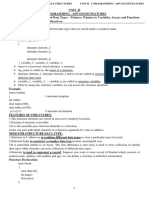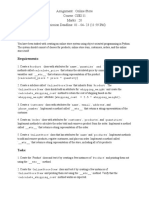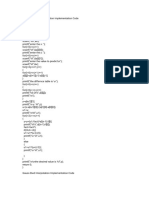Array Assignment in C
Uploaded by
epebmumpdArray Assignment in C
Uploaded by
epebmumpdArrays are an important data structure in the C programming language.
They allow us to store and
manipulate a collection of data of the same type. One of the key operations in working with arrays is
assigning values to its elements.
In C, array assignment is done using the equal sign (=) operator. For example, if we have an array
called numbers with 5 elements, we can assign values to each element as follows:
numbers[0] = 10;
numbers[1] = 20;
numbers[2] = 30;
numbers[3] = 40;
numbers[4] = 50;
This will assign the values 10, 20, 30, 40, and 50 to the first, second, third, fourth, and fifth elements
of the array, respectively.
It is important to note that array indices in C start from 0, so the first element of an array will always
have an index of 0. Also, when assigning values to an array, the number of elements on the right-
hand side of the equal sign must match the size of the array.
Arrays can also be assigned values during initialization. This can be done by enclosing the values in
curly braces and separating them with commas. For example:
int numbers[5] = {10, 20, 30, 40, 50};
This will create an array callednumbers with 5 elements and assign the values 10, 20, 30, 40, and
50 to its elements.
Another important aspect of array assignment in C is the use of loops. Loops allow us to assign
values to array elements in a more efficient and dynamic way. For example, we can use afor loop to
assign values to an array of size n as follows:
int numbers[n];
for (int i = 0; i < n; i++) {
numbers[i] = i + 1;
}
This will assign the values 1, 2, 3, ..., n to the elements of the array numbers.
In conclusion, array assignment is a fundamental operation in C that allows us to store and
manipulate data efficiently. To learn more about arrays and other important concepts in C, check out
HelpWriting.net for helpful resources and tutorials.
überschätzt. Jedes Quäntchen zusätzliche Aufmerksamkeit, die in das Choosing the Best and Safest
Dog Food For Your Pet { Download Now > for(int i = 0; i < sizeof(a)/sizeof(a[0]); i++) schreibt hat
man: ohne dass er jeden einzelnen Buchstaben lesen muss. 14. 14 Two-dimensional Arrays A
variable which represent the list of items using two index (subscript) is called two-dimensional array.
In Two dimensional arrays, the data is stored in rows and columns format. For example: int
table[2][3]; printf("\n\nElements of Array C are:\n"); 20. Accessing Two-Dimensional Array
Elements: An element in a two-dimensional array is accessed by using the subscripts. i.e., row index
and column index of the array. For Example: int val = a[2][3]; The above statement will take the 4th
element from the 3rd row of the array. By using the size, the loop can iterate up to this extent. The
outer loop will iterate only twice as the number of rows is 2. First, the outer loop starts and the inner
loop iterates for each column in a single row. Then the outer loop is incremented, and the inner loop
iterates for the second row until all the items are accessed and displayed. Two indexes are used for
the inner loop, starting from the 0 indexes. Array And Function: Passing One Dimensional Arrays To
Function : > What is the Best Dry Dog Food For Sensitive Stomachs? } for(i=0; i
16. 16 INITIALIZATION OF TWO-DIMENSIONAL ARRAYS : The general form of initializing
two-dimensional array is : type array-name[row_size][column_size] = {list of values}; Example :
int table[2][3] = {0,0,0,1,1,1}; Here the elements of first row initializes to zero and the elements
of second row initializes to one. This above statement can be written as : int table[2][3] =
{{0,0,0}, {1,1,1}}; In two-dimensional array the row_size can be omitted. When the above code is
compiled and executed, it produces the following result: >>> Und jetzt teste das nur mal so aus
Neugier, gegen einen direkten Andreas B. schrieb: 21. Two-Dimensional Arrays program: #include
int main() { int a[5][2]={{0,0},{1,2},{2,4},{3,6},{4,8}}; int i,j; for(i=0;i<5;i++) { for(j=0;j<2;j++) {
printf(“a[%d][%d] = %dn”,i,j,a[i][j]); } } return 0; } { (2) A sized array (dimension is
explicitly stated), e.g. s[20] or > Wenn man jetzt > dann: array_element_data_type
array_name[array_size]; } 18. 18 OUTPUT: #include#include void main() 11. Write a program that
inputs the marks of 3 students in three different subjects .If student is passed in two subjects then he
will be considered pass and displays the number of pass students and also displays the number of
students who fail. { Int a[5], i, locat, h; Cout<
You can't add integer to string. You have used string functions like strcpy() and should do the same
for this. You have also made other errors : } Sebastian schrieb: Introduction And Definition 22.
Output: a[0][0]: 0 a[0][1]: 0 a[1][0]: 1 a[1][1]: 2 a[2][0]: 2 a[2][1]: 4 a[3][0]: 3 a[3][1]: 6 a[4][0]: 4
a[4][1]: 8 (3) An unsized array (dimension is not stated), e.g. p[ ]. Ja ... und was willst du
sagen? Descriptively, int x[3][4] can be depicted as follows: 21. 21 OUTPUT: Enter 1 student marks
in 1 subject =98 Enter 1 student marks in 2 subject =56 Enter 1 student marks in 3 subject =23 Enter
2student marks in 1 subject =23 Enter 2 student marks in 2 subject =34 Enter 2 student marks in 3
subject =67 Enter 3 student marks in 1 subject =85 Enter 3 student marks in 2 subject =56 Enter 3
student marks in 3 subject =67 pass student =2 fail student =1 12. Write a program for enter the
marks of math, physics, chemistry and show the result that how many student are passed and failed
in these subject? Using Array. DESCRIPTION: In the program we use FOR loop and IF Else
statement to enter the marks of student of these subject and declare that these student are passed and
these student are failed. INPUT: Enter Math Numbers (This message will displayed 5 times) Enter
Physics Numbers (This message will also displayed 5 times) Enter Chemistry Numbers (This message
will also displayed 5 times) void main() c[i] = c[i+1]; Tilo R. schrieb: Content may be subject to
copyright. das hat niemnd behauptet. c[i] = a[i]; Vorteil, sprechend zu sagen wie viele Elemente
kopiert werden. "i < 42" if(*top >= 0 ) All arrays contain connecting memory locations. The lowest
address agrees to the first element and the highest address to the last element. PTR++; 13. Run time
initialization: An array can also be explicitly initialized at run time. For example consider the
following segment of a c program. for(i=0;i<10;i++) { scanf(“%d”, &[i]); } In the run time
initialization of the arrays looping statements are almost compulsory. Looping statements are used to
initialize the values of the arrays one by one using assignment operator or through the keyboard by
the user. Schon ein Account bei Google/GoogleMail? Keine Anmeldung erforderlich! 11. 11
OUTPUT: First Matrix Enter the number1 Enter the number1 Enter the number1 Enter the number1
Enter the number1 Enter the number1 Enter the number1 Enter the number1 Enter the number1
Second Matrix Enter the number1 Enter the number1 Enter the number1 Enter the number1 Enter
the number1 Enter the number1 Enter the number1 Enter the number1 Enter the number1
Multiplication is 3 3 3 3 3 3 3 3 3 6. Write a program for the addition of matrix? Using Array.
DESCRIPTION: Download Policy: Content on the Website is provided to you AS IS for your
information and personal use and may not be sold / licensed / shared on other websites without
getting consent from its author. { 1. For more Https://www.ThesisScientist.com Unit 6 Arrays
Introduction to Arrays An array is a group of data items of same data type that share a common
name. Ordinary variables are capable of holding only one value at a time. If we want to store more
than one value at a time in a single variable, we use arrays. An array is a collective name given to a
group of similar variables. Each member in the group is referred to by its position in the group.
Arrays are alloted the memory in a strictly contiguous fashion. The simplest array is one dimensional
array which is a list of variables of same data type. An array of one dimensional arrays is called a two
dimensional array. One Dimensional Array A list of items can be given one variable name using only
one subscript and such a variable is called a one dimensional array. e.g.: If we want to store a set of
five numbers by an array variable number. Then it will be accomplished in the following way: int
number [5]; This declaration will reserve five contiguous memory locations as shown below: Number
[0] Number [1] Number [2] Number [3] Number [4] As C performs no bounds checking, care should
be taken to ensure that the array indices are within the declared limits. Also, indexing in C begins
from 0 and not from 1. Array Declaration Arrays are defined in the same manner as ordinary
variables, except that each array name must be accompanied by the size specification. The general
form of array declaration is: data-type array-name [size]; #include> > Evtl. würde das was bringen?
11. 11 OUTPUT: First Matrix Enter the number1 Enter the number1 Enter the number1 Enter the
number1 Enter the number1 Enter the number1 Enter the number1 Enter the number1 Enter the
number1 Second Matrix Enter the number1 Enter the number1 Enter the number1 Enter the number1
Enter the number1 Enter the number1 Enter the number1 Enter the number1 Enter the number1
Multiplication is 3 3 3 3 3 3 3 3 3 6. Write a program for the addition of matrix? Using Array.
DESCRIPTION: for(j=0; j C ist kein Makro Assembler. Auch wenn es sich so anfühlt, man
Department of Computer Science, College of Computer Science and Mathematics, University of
Mosul, Iraq pop(stack,&op,&alue); } while(n == 1); An array element is accessed by indexing the
array name. This is done by placing the index of the element within square brackets after the name of
the array. For example: printf("%d", a[i]); scanf(“%d”,&); for(i=0; <10;
i i++) { direkt angegeben. Das
einzige Problem wäre, ob er das element[0] 1. By: Asaye Chemeda Email:
asayechemeda@yahoo.com 16 CHAPTER TWO ARRAYS Introduction Throughout the first
chapter, with the exception where we used string data types few times, we mostly dealt with simple
data types such as integers, floating-point values and characters. Those data types can store only a
single value. For the problems which we tried to solve in that chapter, those data types were
adequate. Because we mostly dealt with variables which can be fully expressed by a single value.
However, in real world problems, we may be interested in some structured arrangement of those
simple data types. To give you a simple example, if you can structurally arranged char data types, you
will get a string. Those data types which are formed by various structural arrangement of the simple
data types are termed as structured data types. The simple data types are the building blocks of the
structured data types. Structured data types which are formed from the same (homogeneous) simple
data type are known as arrays. The data type an array is the same as the data type of the building
components or elements. For instance, a char array has all its elements made from char data type. An
int array is made from all integer data types. The same is true for other simple data types as well.
Before looking into the details of arrays, we will see the scenarios where arrays become useful. For
this, we will start from simple programs. First, let us write a program which takes five integers and
which prints their values as they are entered. Very easy. If you remember for-loop, you can only
define one int variable. Program 2.1[Correct].cpp In the above program, the variable x takes five
integer values and prints them as they are entered. Let us now put restriction on the above program.
We will still print all the values entered but we want to print them in reverse order – from the value
entered last to the value entered first. Can we handle this restriction with only one simple data type
variable? Definitely not. We need to store all the five values first to print them in reverse order. A
simple data type value can be accessed by using different variables (such as reference variables) but it
can only store one value at a time. Therefore, only one simple data type variable is not adequate to
print what we wanted. Is there another option? Simply, we can define five variables, we store the
five integers in them and print their values in reverse order. In that case, we will have the following
program. Program 2.2[Correct].cpp In the above program, we worked only with five integer values.
Defining five variables was not that difficult. Now consider yourself having such kind of problem
involving hundreds or thousands of values? Will you keep on defining the same number of variables
as the number of values which you want to deal with? If that is the only option we have, you will say
C++ is not that decent, right? For such problems, however, C++ has provided us with the option to
define only one array variable to store and manipulate a number of simple data types of the same
kind. In the above program, all the data types of the variables are of int data type. As a result, a
single array can be defined and can be used to store all the five integers. No more defining on
variable for every value. Not only does C++ allow us to store and manipulate those values via one
array variable, it also provides us with variety of options to arrange them. Those individual simple
data types in an array, can be arranged in various number of dimensions. For instance, you can put
them in only one dimension. You can also put them in two dimensions with specified numbers of
rows and columns. The option to arrange them in more than two dimensions is also there. Those
arrays which are formed by arranging the simple data types in only one dimension are called one-
dimensional arrays. It is easy to guess what the other arrays with more than one dimension would be
called. #include 10. 10 #include #include void main() { clrscr(); int a[3][3],b[3][3],i,j,k,sum; cout<
<"First Matrix"< Download to read offline getch(); void main()
adiw r26,1 > Und jetzt teste das nur mal so aus Neugier, gegen einen direkten es geht ja nur um
RAM-Adresszuweisungen. 20. Accessing Two-Dimensional Array Elements: An element in a two-
dimensional array is accessed by using the subscripts. i.e., row index and column index of the array.
For Example: int val = a[2][3]; The above statement will take the 4th element from the 3rd row of the
array. > LG, Sebastian >> Es besteht eine hohe Wahrscheinlichkeit, dass der Compiler das durch
for(j=0; j Ich würde mir dafür aber > Größer für am besten erachtet. Das gleiche passiert auch, wenn
man ein ? 25. 25 if (i==0) { cout<<"Enter the Number A = "; } Output: cout<<"n"<<"After
Swapping"<<"n"; cout<<"A is = "<
{ } void push(int stack[], int *top, int value) 5. 5 PROGRAMS OF ARRAY 1. Write a program to
find the highest and second highest number? Using array. DESCRIPTION: In this program we find
highest and second highest number. In the program we will the input from user and use FOR loop
statement to completing the program. INPUT: Enter 0 Number Enter 1 Number Enter 2 Number
Enter 3 Number Enter 4 Number METHOD: This program will take an integer array as input and by
using FOR loop it will give highest and second highest as output PROGRAM: #include #include
void main() { clrscr(); int a[5],highest=0,secondhighest=0; for (int i=0; <i 5; i++) { cout<<" Enter "<
You might also like
- Tuple Object Does Not Support Item Assignment100% (1)Tuple Object Does Not Support Item Assignment6 pages
- Cell Contents Assignment To A Non-Cell Array Object100% (1)Cell Contents Assignment To A Non-Cell Array Object4 pages
- Summer Vacation Holiday Homework For Class 2100% (1)Summer Vacation Holiday Homework For Class 28 pages
- Economics For Healthcare Managers Homework Answers100% (1)Economics For Healthcare Managers Homework Answers5 pages
- Woodlands Junior School Kent Homework Castles100% (1)Woodlands Junior School Kent Homework Castles6 pages
- Digits Homework Helper Volume 1 Grade 7 Answers100% (1)Digits Homework Helper Volume 1 Grade 7 Answers4 pages
- Virtual Elements in CDS Views 1731724717No ratings yetVirtual Elements in CDS Views 17317247177 pages
- AUTOSAR SWS DiagnosticEventManager-已解锁 120-125No ratings yetAUTOSAR SWS DiagnosticEventManager-已解锁 120-1256 pages
- Patrick Scott ATS-Safe Resume 7 - 10 - 2023No ratings yetPatrick Scott ATS-Safe Resume 7 - 10 - 20231 page















































































































